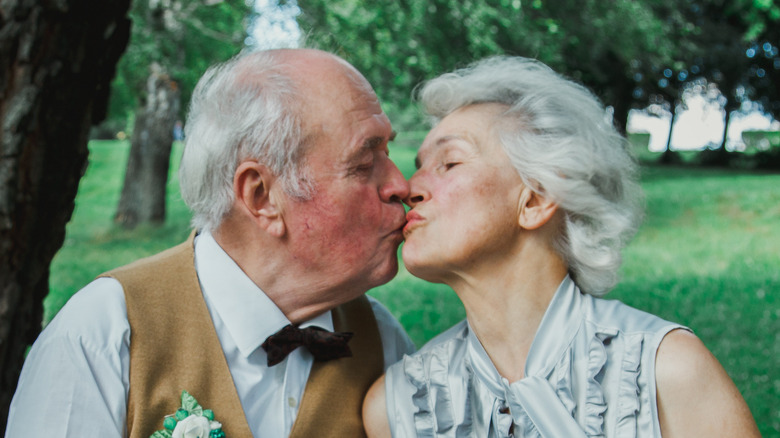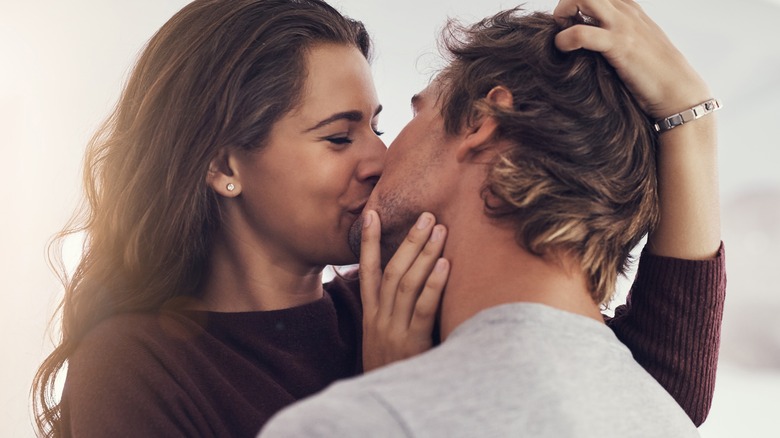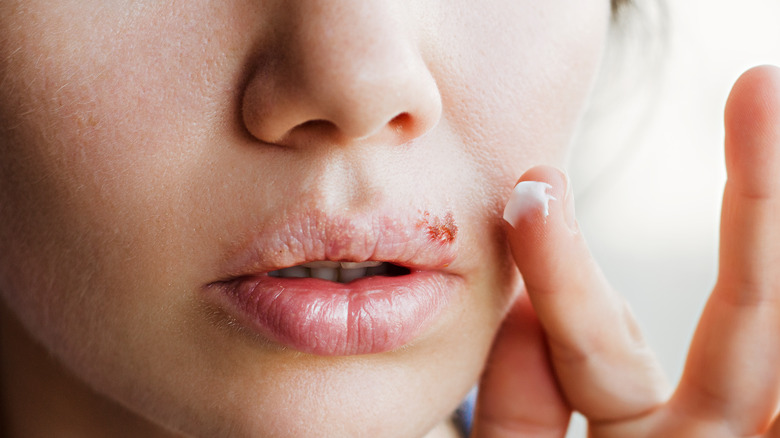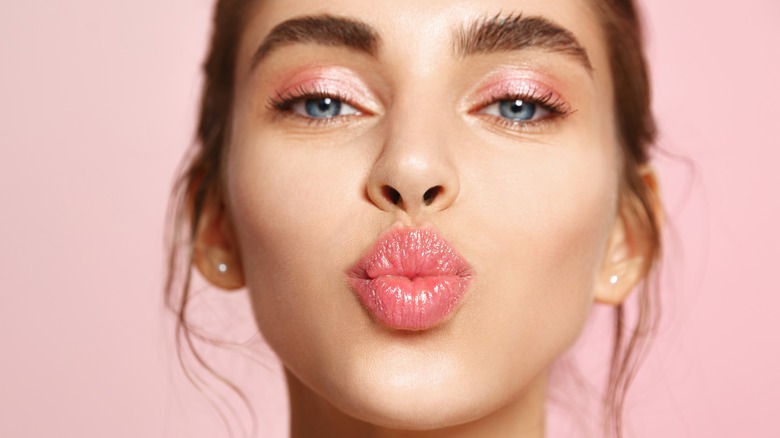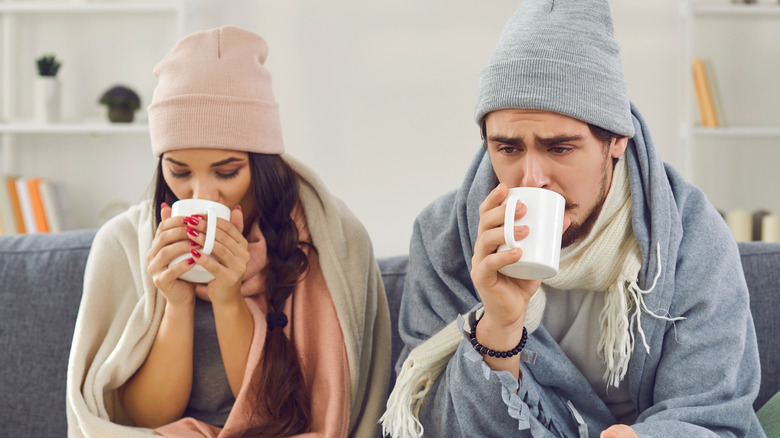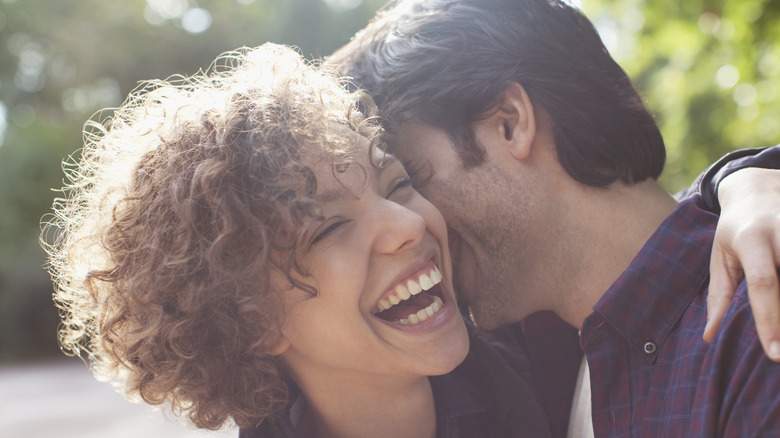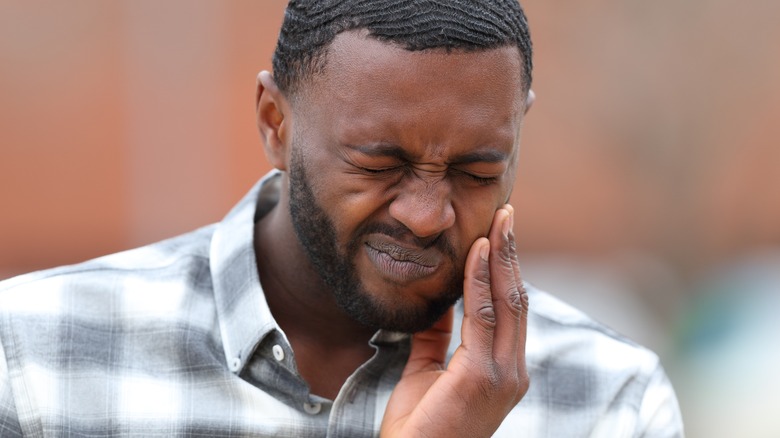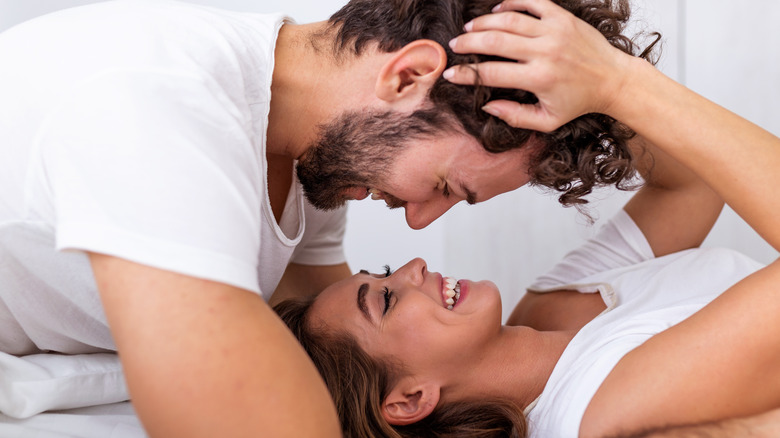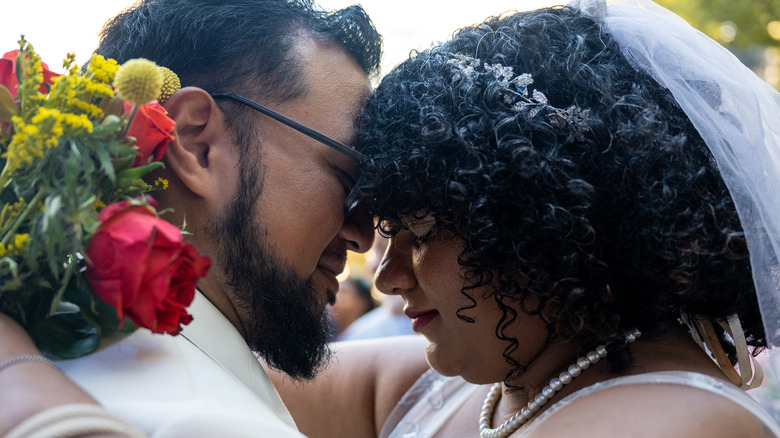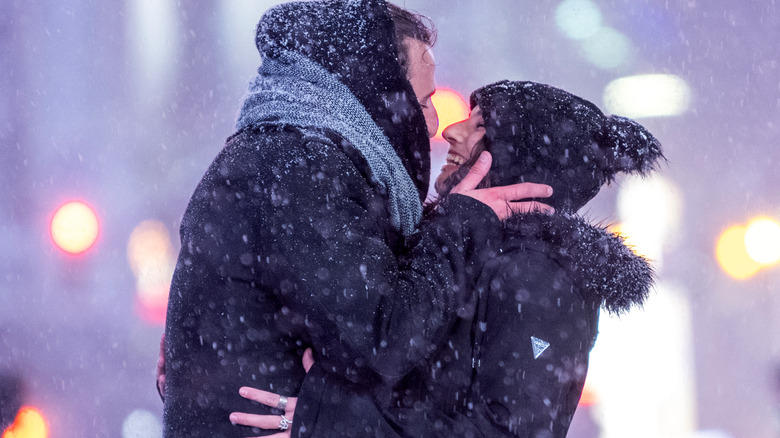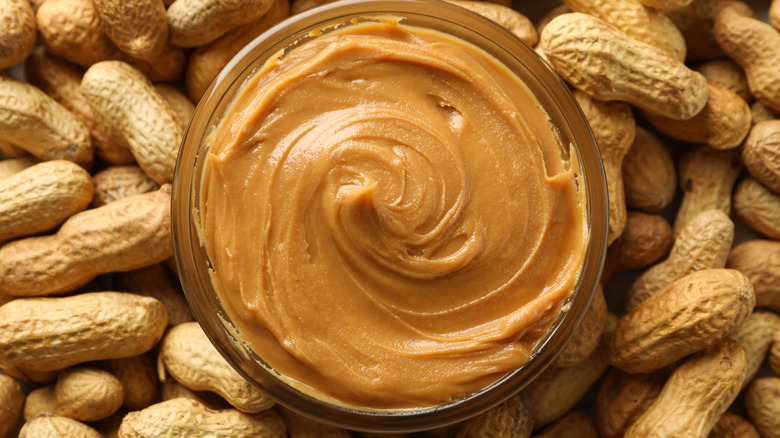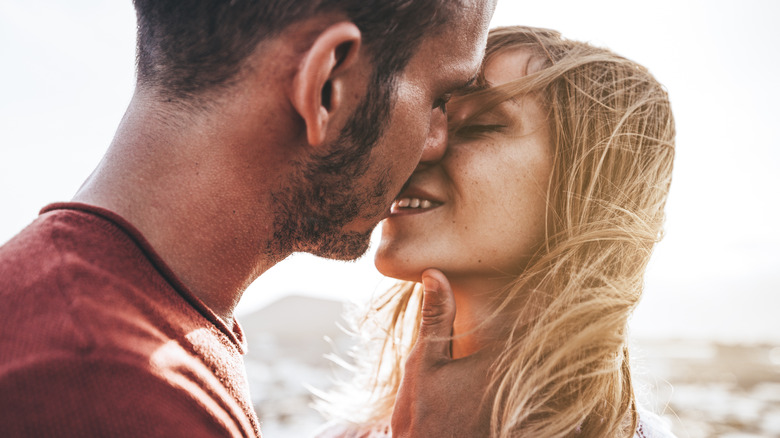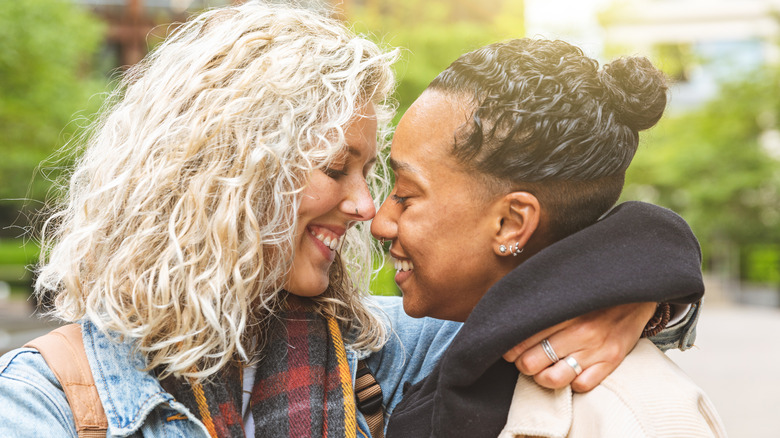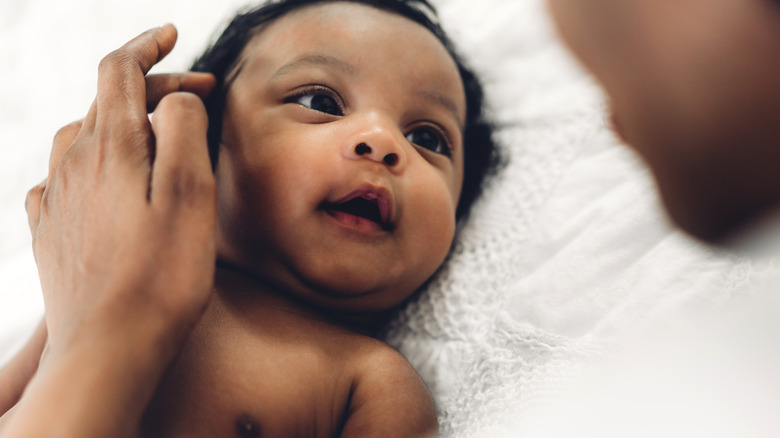The Surprising Side Effects Of Kissing
Kissing has long been used for good luck, to prevent superstitions from coming true, and for connecting with loved ones (via The Old Farmer's Almanac). Although evidence supports the fact that kissing is more of a learned behavior than an innate one, it's clear that the act of kissing has a long and interesting history in sexuality, romance, passion, bonding, and more. In ancient Rome, kissing was even a sign of respect for a kingdom's ruler (per Psychology Today).
Research also says that kissing can lead to some pretty amazing benefits for the body and mind. In fact, the simple act can be so powerful that it enhances relationships, strengthens attachments, and generally boosts our moods (via Healthline). However, what feels good may not always be good for us — and unfortunately, kissing is no exception.
Want to know what happens when you kiss your partner? Keep reading to discover the good and bad side effects of kissing.
Kissing can alleviate stress
Newsflash: Kissing someone else could improve your mental health. According to the British Council, kissing ramps up the production of dopamine, oxytocin, and serotonin, three hormones known for making us feel good by activating the brain's pleasure centers. Dopamine, in particular, is extremely important in regulating stress by responding to stress when it happens (via Experimental & Molecular Medicine). Additionally, people with long-term stress tend to produce lower levels of dopamine (via Psych Congress Network), which could lead to a cycle of stress that's not easy to combat.
So, why not try reducing stress naturally through kissing? Professor and doctor of philosophy in communication Kory Floyd (via Arizona State University) says that affectionate people have better odds of reducing stress than non-affectionate people. One of Floyd's studies noted that kissing, specifically, can lower stress. Floyd's research has found that people who openly show their affection do not respond as negatively or sharply to stress as those who are less affectionate.
You might notice more cold sores
If you've ever felt a strange tingling feeling on your lip a day or so after kissing someone, you probably know that what's coming is a dreadful, painful cold sore. Not only are cold sores unsightly with their red and blistered appearance, but they can also last for several days, sometimes even weeks (per the Mayo Clinic). They often are a result of being infected with a herpes virus, which is easily spread through — you guessed it — smooching.
Although having herpes on your mouth seems scary, cold sores usually go away on their own even without the help of medicine, although some treatments can speed the healing process. Still, if you have a cold sore, it's important to avoid kissing anyone until it goes away so that you don't continue to spread it. Also, refrain from sharing lip balm, makeup, utensils, drinks, and anything else that touches your mouth until you're fully healed (per Colgate). Similarly, if your partner is the one with the cold sore, you might want to swap kissing for cuddling until they're clear.
Give some smooches to strengthen facial muscles
When you kiss someone — even if it's just a peck on the cheek — you need to use your facial muscles. Of course, a smaller kiss won't result in using as many muscles as more passionate kisses. Still, you'll use anywhere from two to 34 facial muscles, depending on how into your smooches you get (via The American Journal Of Medicine).
What does this mean for you? For starters, strengthening a face muscle known as orbicularis oris is important for keeping food down after swallowing. You use this muscle when you kiss, which could help it remain strong for swallowing, chewing, and, of course, kissing more (via the National Library of Medicine). Also, researchers from the Northwestern University Feinberg School of Medicine say that exercising the face may even reduce wrinkles and make you look younger. "Muscle growth is increasing the facial volume and counteracting the effects of age-related fat thinning and skin loosening," explains assistant research professor Emily Poon (via Northwestern Now). If you ever feel the need to experiment with facial exercises to see if they improve wrinkles, kissing might be a fun way to do it.
Sharing saliva increases germ exposure
If your parents told you when you were younger not to kiss other boys or girls because you could get sick, they weren't necessarily wrong, even if they were just trying to scare you enough not to do it. The truth is that our mouths harbor a lot of bacteria. According to NIH News In Health, our mouths hold around 700 species of microbes. That's a whole lot of potential germs to be spreading between you and another person when you kiss.
Mononucleosis is perhaps one of the most common diseases you can transfer to one another when kissing. The condition typically comes with a sore throat, swollen tonsils, and a fever, but it may also produce complications with the spleen, liver, or heart (per Mayo Clinic). Some variations of herpes can also spread through saliva, typically resulting in cold sores (per Healthline). Other viruses, like Ebola and Zika viruses, are also easily transferred from one person to another through saliva (via the National Library of Medicine).
Kissing could improve your oral health
According to experts at Infinity Dental Associates, one of saliva's most important roles is being a natural cleanser for the mouth. As it moves through the mouth, it washes away food and drink particles that normally would stay on your teeth until you brush them. WebMD also states that saliva can help combat germs in your mouth, and contains important minerals and nutrients your teeth need to stay strong and healthy.
Of course, kissing — especially passionate kissing — boosts saliva production, which could help your mouth stay cleaner overall. So, there may be some benefits for you and your mouth when you participate in deep kissing with a partner. But to be on the safe side, avoid kissing a person when they have symptoms of sickness or signs of cold sores. And, most importantly, don't substitute kissing for good oral hygiene; brushing and flossing are still necessary for the best possible oral health (via Infinity Dental Associates).
But smooching can also be bad for your gums and teeth
Where there's good news comes some bad news, and kissing might be just as bad for your teeth and gums as it is good. That's because when you kiss someone — especially with deep, passionate kisses — you share saliva. In that saliva hides lots of germs that could wreak havoc on your otherwise healthy mouth. A study published in Microbiome found that couples who kiss frequently have more microbiota in their mouths, meaning more opportunities for germs to stay put.
Some of those germs transform sugar into teeth-destroying acids that break down enamel. When you consume sugar, you help that bacteria thrive and continue their fight against your teeth (via NIH News In Health). And, if you kiss someone with cavities, you might even take that cavity-causing bacteria into your own mouth, Emanuel Layliev, D.D.S., tells SELF. According to Layliev, "Cleansing your mouth with an antiseptic mouth rinse after intimate contact should lessen your susceptibility." So, be sure to have your tooth care products handy after smooching to keep your oral health in check.
Share a goodnight kiss for better sleep
Kissing your partner good night becomes a habit for many couples who have been together for a while. However, science suggests that this simple bedtime act can have some impressive benefits for your sleep. According to The Better Sleep Council, showing affection or being intimate before you go to sleep could improve your overall sleep quality that night, thanks to the ramped-up production of oxytocin that occurs from intimacy with your loved one.
A Silentnight study (via Prima) researched the effects of a good night kiss on the body's ability to sleep. The study found that a whopping 70% of participants reported better sleep if they kissed their partners good night. Additionally, as many as 38% of women admitted to sleeping poorly if they didn't have that kiss before bedtime. Silentnight sleep expert Nerina Ramlakhan explains: "Hearing that people sleep better after a good night's sleep makes sense, as kissing decreases the stress hormone cortisol and increases serotonin levels in the brain, so [it] can have a similar effect to meditation, which is a great way to drift off."
You strengthen bonds when you kiss
Having a hard time getting along with your partner lately? Perhaps all you need to do is kiss more frequently to remind yourself of why you're together. When you kiss a partner, levels of oxytocin increase. There's a reason oxytocin is also known as the love hormone: It strengthens feelings of love and affection (via British Council). You might even notice this behavior in animals like lions and dogs, who participate in kissing-like behaviors like licking and nuzzling as part of their communication and bonding processes (per Psychology Today).
Rutgers University researcher Helen Fisher explains to Reuters that kissing helps people find mates. Fisher has found links to kissing affecting the brain's control over attachment, helping people form bonds long enough to have children together, at minimum. The British Council also notes that increased serotonin production resulting from kissing could also help create those tight bonds with a partner, as serotonin helps us retain the memory of a kiss and the feelings we have when enjoying it.
You may gain health benefits
Kissing doesn't just make you feel euphoric; it also has benefits that could improve your physical health. According to Dr. Kory Floyd (via Arizona State University), people who show affection — whether through kissing, hugging, or touching — tend to have lower blood pressure, cholesterol, and stress levels, all of which can significantly impact several aspects of your health. Because kissing may strengthen your bond with your partner and help you enhance feelings of love and affection, it could also do wonders for your heart. Cardiologist Christopher Suhar tells Scripps, "Blood pressure responds to calmness and peace. If you're in love, you're calmer and more at peace, which could translate into lower blood pressure."
A study conducted by Floyd and other researchers and published in the Western Journal of Communication evaluated the effects of kissing on 52 people in cohabiting or marital relationships. Each couple completed a six-week trial that included self-reported relationship assessments measuring elements of their relationship, like kissing habits and communication, and laboratory testing to record physical markers, like cholesterol levels. Ultimately, the researchers found that kissing may reduce stress enough to positively impact other physical and mental health components, like cholesterol and depression.
Allergic reactions are possible
We know that kissing can move a lot of germs between mouths, but there's also some evidence that suggests that people with food allergies could be at risk for allergic reactions when they kiss someone. Researchers (via the Journal of Investigational Allergology and Clinical Immunology) assessed allergic reactions in more than 1,100 survey respondents relating to close contact, including kissing, with other people. Allergic reactions when in close contact with someone who recently ate a food a person was allergic to were reported in 12% of respondents.
According to the American College of Allergy, Asthma and Immunology's president, Sami Bahna (via Medical News Today), "If you have food allergies, having an allergic reaction immediately after kissing someone who has eaten the food or taken oral medication that you are allergic to isn't highly unusual." Bahna added that in some cases, patients had an allergic reaction after their partner brushed their teeth or even hours after they'd finished their meal, because their saliva still contained the allergen. Non-allergic partners should take care to avoid kissing their partners for 16 to 24 hours if they eat something their partner is allergic to.
The act of kissing burns a few calories
Although you shouldn't expect to burn as many calories from kissing as you would with a good gym workout, kissing can shed a few calories. University of Louisville professor Bryant Stamford tells WebMD, "During a really, really passionate kiss, you might burn two calories a minute — double your metabolic rate." Stamford adds that turning up the volume on a kiss could have a similar caloric burn as a brisk walk.
According to Healthline, the number of calories you burn when kissing depends on a few factors, like your age, weight, biological sex, and the intensity of the kiss. With really passionate kissing, it may be possible to burn as many as 26 calories per minute. Basically, the more you move during a kiss, the more you can burn. So, if you want to maximize the caloric burn of a kiss, using your hands to explore a partner or making out might prove to be more beneficial than a simple peck or two.
Your immune system could get stronger
We've discussed how introducing another person's saliva into your mouth through a kiss can also introduce germs, allergens, and bacteria that cause cavities and other oral health issues. However, being exposed to new bacteria isn't always a bad thing. According to the Better Health Channel, when your body takes in new germs from your partner, your immune system jumps into action to combat those germs, essentially boosting your immune system.
A 2014 study in Microbiome evaluated the oral microbiota of couples. Researchers found that the couples transferred an average of 80 million bacteria to one another for each passionate kiss lasting at least 10 seconds. That's a lot of bacteria! Furthermore, the study results show a link between frequent passionate kissing between couples and a change in oral microbiota, with each couples' microbiota resembling one another, especially on the tongue's surface. An article in Cell Research explains that a person's microbiome plays a key role in building immunity against health problems like inflammation, metabolic disease, and digestive problems.
Babies are highly susceptible to kissing risks
Some of the good-for-you benefits of kissing can happen when kissing loved ones other than a romantic partner, too, like lowering stress and strengthening bonds. Still, as kissable as adorable baby cheeks are, it's important to show caution when getting too close. Kissing a baby can be dangerous for them and their immature immune systems.
According to Women & Infants, respiratory syncytial virus (RSV) is a highly contagious respiratory virus caused by physical contact with someone carrying the virus, and kissing is an easy way to spread it. The CDC adds that babies six months or younger are especially susceptible to developing severe symptoms from RSV, as are premature babies and children with weakened immune systems. Severe RSV can lead to complications like pneumonia and respiratory inflammation.
One of the best ways to keep babies safe from RSV is to keep them away from sick people and wash your hands frequently, especially before holding a baby. And of course, be careful about kissing. "Spread of infection through kissing depends on a number of factors, such as where the baby was kissed — near her mouth or nose is worse than on her feet, and kisses on fingers are also worse, as babies can suck their fingers," pediatrician Hansa Bhargava tells WebMD, who added that there's minimal risk in kissing a baby's feet (and that kissing babies is a no-no for sick people).

